Giandomenico Majone Prize
The Prize is in honour of Giandomenico Majone for his outstanding contribution to the study of regulatory governance in the European Union and beyond.
It recognizes exceptional research presented at the Biennial Conference of the ECPR Standing Group on Regulatory Governance. The Prize addresses scholars in their early career stages, e.g. colleagues who have completed their Ph.D. no more than seven years prior to nomination, and is preferably awarded to single-authored papers. The submissions are assessed by a jury, based on the academic merit of the paper. This includes the relevance and development of the research question, the contribution that the article makes to existing scientific knowledge or theory in the field of regulatory governance, the use of sources, the methodological rigor, the quality of the analysis and the conclusions.
The previous winners of the Prize are:
- 2023: Nir Kosti
- 2021: Jose Maria Valenzuela
- 2018: Janina Grabs
- 2016: Ittai Bar-Siman-Tov
- 2014: Stratos Patrikios and Fabrizio De Francesco
- 2012: Kristian Krieger
- 2010: Hanan Haber
- 2008: John Mikler
2023: Nir Kosti

The 2023 Majone Prize Committee consisted of Judith van Erp (chair), Colin Scott and Camilo Ignacio González Becerra. The Committee was pleased to receive nine submissions for consideration. Eight of these submissions were single-authored. The jury would like to suggest to the ECPR that in light of the increasing practice of collaborative work in academia, the preference for a single-authored paper might be reconsidered, while maintaining the focus on early career researchers.
The Committee has decided to award the Giandomenico Majone Prize to Nir Kosti, Hebrew University of Jerusalem, for his paper ‘More Discretion, More Regulation? Policy Implementation through Regulation in the United Kingdom, 1991-2022’, presented at the 9th Biennial Conference of the ECPR Standing Group on Regulatory Governance, Antwerp, Belgium.
The study focuses on the execution of policies through implementing regulations. When legislators delegate authority to executive bodies, not all policies are translated into regulations and therefore implemented. This paper asks under what conditions delegated power actually becomes regulation. The research suggests that delegation which minimizes discretion – especially in terms of the obligation to regulate and the inclusion of content provisions that specify what regulations must, may and must not do – increases the likelihood of implementation. The paper analyses nearly 45,000 statutory instruments or regulations in the United Kingdom over a period of thirty years, that are analyzed through innovative computational methodologies and Natural Language Processing.
The jury appreciated the clear question, demarcation and conceptualication of the paper. It is a well-delineated contribution, convincingly presented. The data collection and analysis are impressive and sophisticated. The paper’s orientation to regulation as an instrument for implementing and enforcing policies brings us back to the core of the regulatory state and its effectiveness. Effective policy implementation is of paramount importance given the complex and urgent challenges our governments face. The paper offers solid evidence about legislative characteristics that determine policy effectiveness, and enhances our understanding of the relationship between the legislative and executive branches of government. It offers clear implications for legislative quality and design. This policy-relevant paper is a well deserved winner of the Majone Prize.
The Committee would also like to commend the relevant, convincing and well executed paper ‘The Perceived Legitimacy of Regulatory Agencies: Expertise-Based or Reputation-Sourced?’, authored by Dovilė Rimkutė and Honorata Mazepus.
2021: Jose Maria Valenzuela

The 2021 Giandomenico Majone Prize was awarded to Jose Maria Valenzuela, University of Oxford for his paper “System Operators and Regulatory Governance for the Rapid Decarbonisation of Electricity Systems: a State-Business Configuration Perspective”, presented at the 8th Biennial Conference of the ECPR Standing Group on Regulatory Governance, Exeter, United Kingdom.
The Majone Prize Committee included Ulrika Mörth (chair), Martin Lodge, Alessia Damonte and Koen Verhoest.
According to the Committee, “the paper advances our understanding of regime dynamics on different national experiences, regulatory structures and legacies in the governance of electricity systems, and how governments can overcome the government’s dilemma by mechanisms of reconfiguration of state-business regulations. The paper addresses a highly important and clear research problem and makes a convincing argument for how the study contributes to previous research on electricity governance The paper includes an extensive discussion of country cases and offers rich insights into state-business configurations in four different systems.”
2018: Janina Grabs
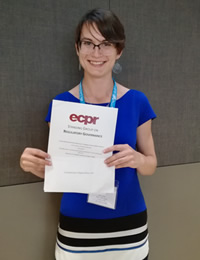 The 2018 Giandomenico Majone Prize for the best paper by a junior scholar presented at the 7th Biennial Conference of the ECPR Standing Group on Regulatory Governance, held in Lausanne, Switzerland, was awarded to Janina Grabs.
The 2018 Giandomenico Majone Prize for the best paper by a junior scholar presented at the 7th Biennial Conference of the ECPR Standing Group on Regulatory Governance, held in Lausanne, Switzerland, was awarded to Janina Grabs.
The Majone Prize Committee consisted of Graeme Hodges, Anne Meuwese and Colin Provost. The Committee was impressed by the high quality of all nine submitted papers. While some focused on theoretical contributions, others showcased novel and innovative methodologies. All papers dealt with important questions of regulatory governance.
Ultimately, the committee unanimously decided to award the prize to “The Effectiveness of Private Sustainability Governance: a Micro-Institutional Approach”, written by Janina Grabs, a Ph.D. candidate and research associate at the Institute of Political Science of Westfälische Wilhelms-Universität Münster. Members of the committee agreed that the paper posed important questions on the effectiveness of private regulatory governance; the data collection effort was vast, yet conducted with precision and care; the methods were rigorous and the paper had a high level of real-world applicability. “Consequently, the paper makes a strong theoretical contribution to the broad field of regulatory governance and we are happy to award it the 2018 Majone Prize!”
2016: Ittai Bar-Siman-Tov
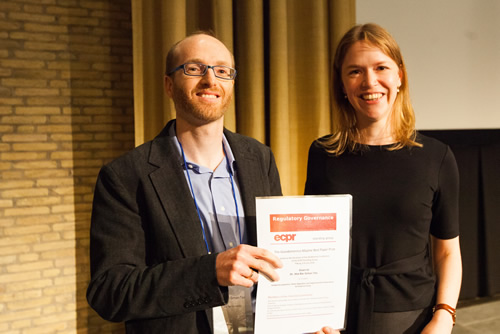
Ittai Bar-Siman-Tov is the winner of the 2016 Giandomenico Majone Prize, awarded for his paper “Temporary Legislation, Better Regulation and Experimentalist Governance: an Empirical Study”, presented at the 6th Biennial Conference of the ECPR Standing Group on Regulatory Governance, Tilburg, the Netherlands.
The jury has assessed all submissions on basis of their academic merit, including the relevance and development of the research question, the contribution that the article makes to our theoretical or empirical knowledge in the field of regulatory governance, the use of data, methodological rigour, the quality of the analysis and the conclusions. Special mention should go to the paper by Karen Lee entitled “Procedural and Institutional Legitimacy in the New Regulatory State”.
The winning paper is an outstanding study of the use of temporary legislation. The paper sits at the intersection of regulation and legislative studies, and the literature review is embedded in different disciplines. It presents a new data set on temporary legislation that enriches our understanding of an important yet so far understudied phenomenon. Temporary legislation, or ‘sunset’ legislation, has been the subject of legal research but has not yet attracted attention from empirically-minded scholars.
The findings demonstrate the relevance of temporary legislation – its share in legislation is growing, after all. At the same time, they challenge the promise that temporary legislation can be a form of experimental policy making. Instead, temporary legislation seems to be a functional solution to challenges of law making, making possible the adoption of policies on controversial issues or in times of crisis. The jury is impressed by the descriptive analysis, the rich data set and the thorough research design informing the paper. It should be publishable with some minor improvements.
Karen Lee’s paper deserves a special mention. Hers is a well-crafted paper that asks whether we can judge industry rule making by similar means as legislative rule making by government. The question is addressed via a theoretically inspiring juxtaposition of responsiveness that improves efficiency (regulatory scholars) and procedural and institutional legitimacy (rule of law). The strength of the paper lies in its ability to develop the underlying rationales of procedural and institutional legitimacy (transparency, impartiality, deliberation and accountability) in order to derive mechanistic implications that are in principle observable in industry governance, too.
2014: Stratos Patrikios and Fabrizio De Francesco
The 2014 Giandomenico Majone Prize for the best conference paper was awarded to Stratos Patrikios and Fabrizio De Francesco for their paper ‘Churches as Firms’, presented at 5th Biennial Conference of the ECPR Standing Group on Regulatory Governance, held in Barcelona, Spain.
The Award Committee included Jarle Trondal, Linda Senden, Ioannis Papadopoulos and Claire Dunlop.
The awarded paper empirically assesses whether regulatory institutions control religious and secular markets differently. The paper finds that among the most developed countries, the extent of religious regulation closely mirrors the extent of business regulation. The paper concludes that the choices facing regulatory institutions are not differentiated by sector or markets. These findings increase our understanding of isomorphic processes in regulatory institutions and it is applied to a novel case.
The Prize Committee sees the merit of the paper in its innovative research question and case selection. Findings of the paper provide new perspectives to regulatory theories. The paper is also clear and straight forward in terms of formulation of research questions and overall focus.
2012: Kristian Krieger
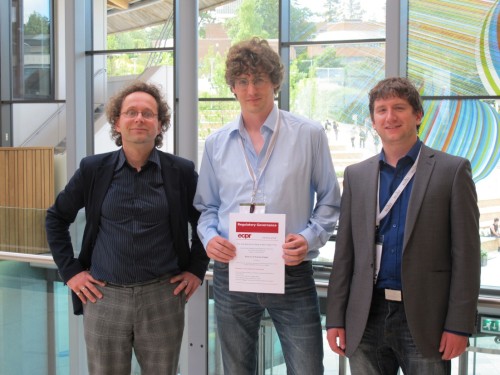 The 2012 Giandomenico Majone Prize was awarded to Kristian Krieger during the 4th Biennial Standing Group Conference in Exeter, United Kingdom.
The 2012 Giandomenico Majone Prize was awarded to Kristian Krieger during the 4th Biennial Standing Group Conference in Exeter, United Kingdom.
The Award Committee was composed of Koen Verhoest, Colin Scott, Annetje Ottow and Martino Maggetti. It is balanced in terms of members coming from different disciplines (law, political science, public administration), being at different career stages, and gender.
The Award Committee received 17 submissions and scored all papers on the following criteria: originality, relationship to the literature, methodology and theory (conceptualization, measurement and analysis), soundness of the results, implications for future research, practice or society, quality of communication. Six of the 17 papers submitted were of a very strong quality and three were outstanding. The selection of the Award winner was therefore not an easy task.
Kristian Krieger’s award-winning paper studies “Norms, Structures, Procedures and Variety in Risk-Based Governance: the Case of Flood Management in Germany and England”. The paper scores best overall on the criteria mentioned above. Krieger challenges the assumption that risk-based governance is universally and uniformly applied in developed countries by comparing contemporary flood management in Germany and England. Drawing on in-depth empirical research, this paper shows that the role, influence and even definition of ‘risk’ is shaped within the institutional environments of German and English flood management. In particular, the use and conceptualisations of risk in governance are promoted, filtered or constrained by administrative structures, norms, and political and cultural expectations in each country.
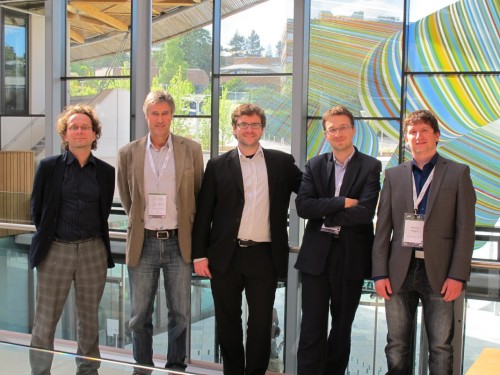 However, although Krieger’s paper was strongest in all respects, we want to pay tribute to two other papers which were shortlisted for the Majone Prize. We want to give them an honourable mention because they both make important contributions to our field.
However, although Krieger’s paper was strongest in all respects, we want to pay tribute to two other papers which were shortlisted for the Majone Prize. We want to give them an honourable mention because they both make important contributions to our field.
The first is by Murray Petrie, a Senior Associate at the Institute of Policy Studies, Victoria University of Wellington, New Zealand, entitled “Jurisdictional Integration: a Framework for Measuring and Predicting the Depth of International Regulatory Cooperation in Competition Policy”. The paper is very original and strong in its development of new ways to measure international regulatory cooperation, such it can be replicated in sectors other than competition policy. Using a database of 92 agreements the author shows the applicability of the measurement for describing and explaining the depth of international regulatory cooperation or to use this measurement as an explanatory factor.
The second paper is a theoretical piece of work by Giacomo Luchetta, a Ph.D. student in Law and Economics at LUISS University, Rome, Italy, and also a researcher at the Centre for European Policy Studies, Brussels, Belgium, and his co-author Sven Höppner, a Research Fellow at the Centre for Advanced Studies in Law and Economics, Gent University Law School, Belgium. Their paper “Praising Their Own Wine: EU Legislators and Non-Falsifiable Statements in Impact Assessments” theorizes why the EU parliament accepts non-falsifiable statements in regulatory impact assessments prepared by the European Commission. The authors rely on principal-agent theory and transaction cost theory. However, the most innovative aspect of the paper is that the authors also use social-psychological theories and behavioural economics to explain the lack of retaliation by EU legislators.
2010: Hanan Haber
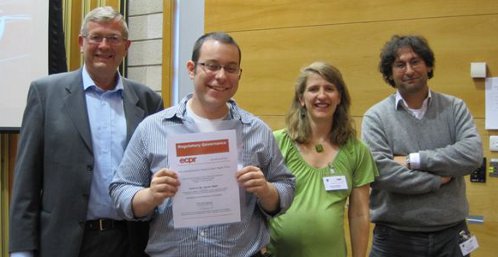 The EJPR Standing Group on Regulatory Governance awarded the 2010 Giandomenico Majone Prize to Hanan Haber for his paper “Regulating-for-Welfare: a Comparative Study of ‘Regulatory Welfare Regimes’ in the Israeli, British and Swedish Electricity Sectors”, presented at the 3rd Biennial Conference held at the University College Dublin, Ireland. Hanan is a doctoral student in the School of Public Policy, Hebrew University of Jerusalem, Israel.
The EJPR Standing Group on Regulatory Governance awarded the 2010 Giandomenico Majone Prize to Hanan Haber for his paper “Regulating-for-Welfare: a Comparative Study of ‘Regulatory Welfare Regimes’ in the Israeli, British and Swedish Electricity Sectors”, presented at the 3rd Biennial Conference held at the University College Dublin, Ireland. Hanan is a doctoral student in the School of Public Policy, Hebrew University of Jerusalem, Israel.
The Prize Committee included Per Lægreid, Bronwen Morgan and Kutsal Yesilkagit.
Among the nominated papers, this one scores best overall on theoretical, methodological and empirical issues. Haber addresses the impact of the state’s welfare policy tradition on the design of new regulatory regimes and on the emergence of what the author calls “regulatory welfare regimes”. It is a coherent and well-written paper with a thorough research design. Above all it is comparative. Haber has a good command of the relevant literature and carries out a well done theoretical informed analysis. He integrates welfare state theory in really interesting ways with the regulatory capitalism literature and uses comparative case studies to good effect to support the argument. The finding is interesting and somewhat surprising. The paper represents a promising line of research that makes an important contribution to regulatory governance research.
2008: John Mikler
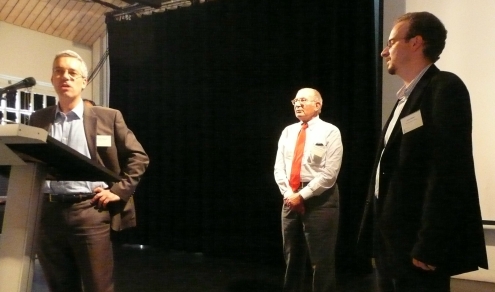 The EJPR Standing Group on Regulatory Governance awarded its first Giandomenico Majone Prize to John Mikler for his paper “Domestic Liberalisation as Global Regulation: the Cases of Fuel Economy and Online Gambling Regulations”, given at the 2nd Biennial Conference held at Utrecht University, the Netherlands.
The EJPR Standing Group on Regulatory Governance awarded its first Giandomenico Majone Prize to John Mikler for his paper “Domestic Liberalisation as Global Regulation: the Cases of Fuel Economy and Online Gambling Regulations”, given at the 2nd Biennial Conference held at Utrecht University, the Netherlands.
John is a lecturer in the Department of Government and International Relations at the University of Sydney, Australia. Although he is an early career researcher, John has around ten years experience in policy development and implementation through several positions with the Australian Commonwealth Public Service.
The Prize Committee was chaired by Claudio Radaelli and included Markus Haverland and Jarle Trondal.
The Committee considering that John’s paper “proposes a fresh and original approach to the theme of the conference, criticising some blunt statements made by political scientists on the advent of ‘neoliberalism’ and ‘globalisation’. Blending different theoretical inspirations, John Mikler provides evidence from two great case studies to support his arguments”. The Prize Committee found that this paper is by far the most exciting among those submitted for the Majone Prize in terms of blending theory and empirical evidence.

